大学英语泛读第4册句子翻译
泛读4课文翻译
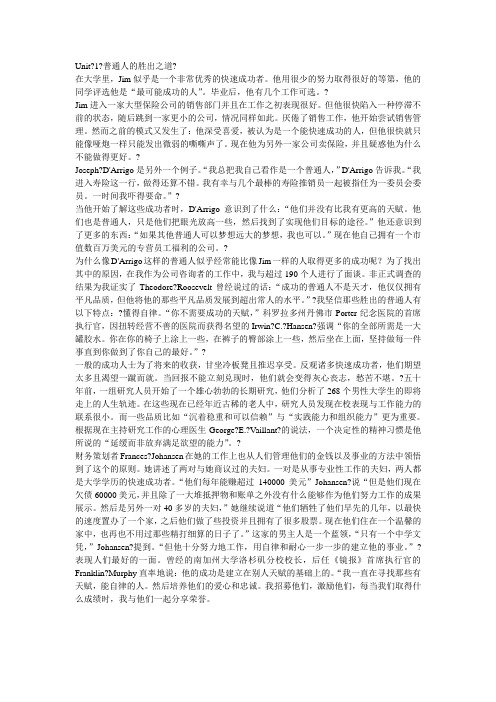
Unit?1?普通人的胜出之道?在大学里,Jim似乎是一个非常优秀的快速成功者。
他用很少的努力取得很好的等第,他的同学评选他是“最可能成功的人”。
毕业后,他有几个工作可选。
?Jim进入一家大型保险公司的销售部门并且在工作之初表现很好。
但他很快陷入一种停滞不前的状态,随后跳到一家更小的公司,情况同样如此。
厌倦了销售工作,他开始尝试销售管理。
然而之前的模式又发生了:他深受喜爱,被认为是一个能快速成功的人,但他很快就只能像哑炮一样只能发出微弱的嘶嘶声了。
现在他为另外一家公司卖保险,并且疑惑他为什么不能做得更好。
?Joseph?D'Arrigo是另外一个例子。
“我总把我自己看作是一个普通人,”D'Arrigo告诉我。
“我进入寿险这一行,做得还算不错。
我有幸与几个最棒的寿险推销员一起被指任为一委员会委员。
一时间我吓得要命。
”?当他开始了解这些成功者时,D'Arrigo意识到了什么:“他们并没有比我有更高的天赋。
他们也是普通人,只是他们把眼光放高一些,然后找到了实现他们目标的途径。
”他还意识到了更多的东西:“如果其他普通人可以梦想远大的梦想,我也可以。
”现在他自己拥有一个市值数百万美元的专营员工福利的公司。
?为什么像D'Arrigo这样的普通人似乎经常能比像Jim一样的人取得更多的成功呢?为了找出其中的原因,在我作为公司咨询者的工作中,我与超过190个人进行了面谈。
非正式调查的结果为我证实了Theodore?Roosevelt曾经说过的话:“成功的普通人不是天才,他仅仅拥有平凡品质,但他将他的那些平凡品质发展到超出常人的水平。
”?我坚信那些胜出的普通人有以下特点:?懂得自律。
“你不需要成功的天赋,”科罗拉多州丹佛市Porter纪念医院的首席执行官,因扭转经营不善的医院而获得名望的Irwin?C.?Hansen?强调“你的全部所需是一大罐胶水。
你在你的椅子上涂上一些,在裤子的臀部涂上一些,然后坐在上面,坚持做每一件事直到你做到了你自己的最好。
大英4泛读翻译Book4
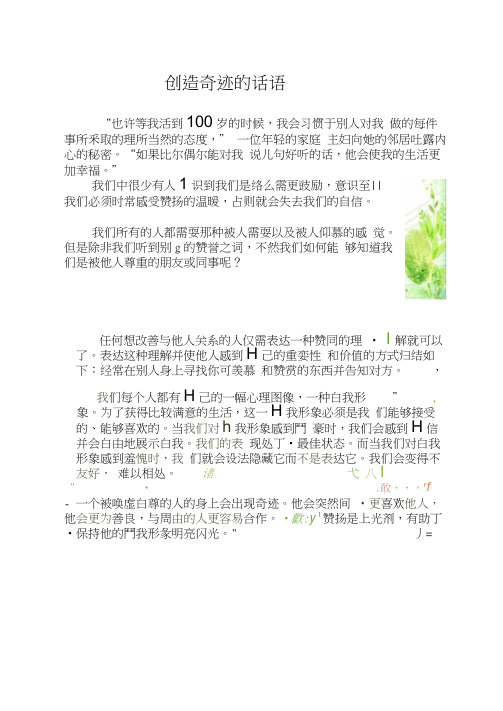
创造奇迹的话语“也许等我活到100岁的时候,我会习惯于別人对我做的每件事所釆取的理所当然的态度,” 一位年轻的家庭主妇向她的邻居吐露内心的秘密。
“如果比尔偶尔能对我说儿句好听的话,他会使我的生活更加幸福。
”我们中很少有人1识到我们是络么需更豉励,意识至||我们必须时常感受赞扬的温暖,占则就会失去我们的自信。
我们所有的人都需耍那种被人需耍以及被人仰慕的感觉。
但是除非我们听到别g的赞誉之词,不然我们如何能够知道我们是被他人尊重的朋友或同事呢?任何想改善与他人关系的人仅需表达一种赞同的理• I 解就可以了。
表达这种理解并使他人感到H己的重娈性和价值的方式归结如下:经常在别人身上寻找你可羡慕和赞赏的东西并告知对方。
,我们每个人都有H己的一幅心理图像,一种白我形”,象。
为了获得比较满意的生活,这一H我形象必须是我们能够接受的、能够喜欢的。
当我们对h我形象感到鬥豪时,我们会感到H信并会白由地展示白我。
我们的表现处丁•最佳状态。
而当我们对白我形象感到羞愧时,我们就会设法隐藏它而不是表达它。
我们会变得不友好,难以相处。
诸弋八I“•.敢、、,r f- 一个被唤虚白尊的人的身上会出现奇迹。
他会突然间•更喜欢他人,他会更为善良,与周由的人更容易合作。
•歡:y 1赞扬是上光剂,有助丁•保持他的鬥我形彖明亮闪光。
" 丿=■但这与你赞扬別人有何关系呢?关系多多。
你有能力■让奇迹在另外一个人身上出现。
当你増强他自尊心的时候,你会使他喜欢你.想和你合作。
切斯特菲尔徳爵士向他的儿子提出这样一条不同寻常的建议,耍他效仿徳尼韦奴瓦公爵,“你会发现他是让人们先喜欢他们自己进而才喜欢上他的。
”赞扬的影响确实是巨大的。
一位新牧师戏称教堂为“冰箱”以此来反对批评他的教众对陌生人的冷漠。
相反,他开始欢迎來自讲坛的來访者并吿诉他的教众他们有多么友好。
之后,他提出了他想耍的,能够给人们快乐生活的有好声誉的教会的构想,使教众变得和缓。
他说,“赞扬能使冷情的成员变成热情的人。
新编大学英语四泛读课文翻译
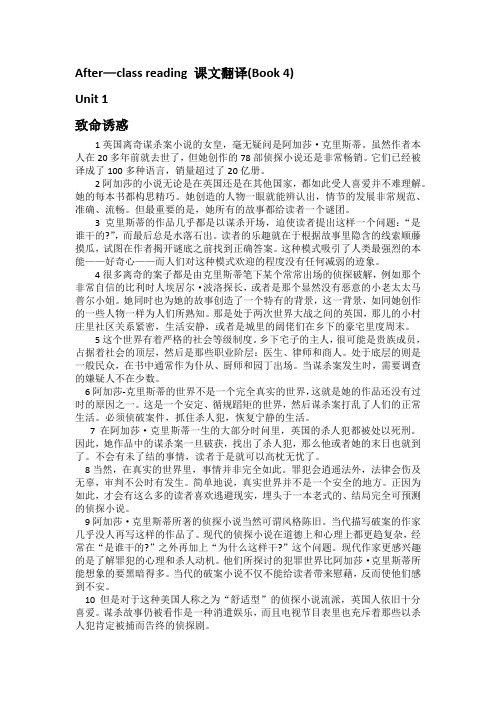
After—class reading 课文翻译(Book 4)Unit 1致命诱惑1英国离奇谋杀案小说的女皇,毫无疑问是阿加莎·克里斯蒂。
虽然作者本人在20多年前就去世了,但她创作的78部侦探小说还是非常畅销。
它们已经被译成了100多种语言,销量超过了20亿册。
2阿加莎的小说无论是在英国还是在其他国家,都如此受人喜爱并不难理解。
她的每本书都构思精巧。
她创造的人物一眼就能辨认出,情节的发展非常规范、准确、流畅。
但最重要的是,她所有的故事都给读者一个谜团。
3克里斯蒂的作品几乎都是以谋杀开场,迫使读者提出这样一个问题:“是谁干的?”,而最后总是水落石出。
读者的乐趣就在于根据故事里隐含的线索顺藤摸瓜,试图在作者揭开谜底之前找到正确答案。
这种模式吸引了人类最强烈的本能——好奇心——而人们对这种模式欢迎的程度没有任何减弱的迹象。
4很多离奇的案子都是由克里斯蒂笔下某个常常出场的侦探破解,例如那个非常自信的比利时人埃居尔·波洛探长,或者是那个显然没有恶意的小老太太马普尔小姐。
她同时也为她的故事创造了一个特有的背景,这一背景,如同她创作的一些人物一样为人们所熟知。
那是处于两次世界大战之间的英国,那儿的小村庄里社区关系紧密,生活安静,或者是城里的阔佬们在乡下的豪宅里度周末。
5这个世界有着严格的社会等级制度。
乡下宅子的主人,很可能是贵族成员,占据着社会的顶层,然后是那些职业阶层:医生、律师和商人。
处于底层的则是一般民众,在书中通常作为仆从、厨师和园丁出场。
当谋杀案发生时,需要调查的嫌疑人不在少数。
6阿加莎-克里斯蒂的世界不是一个完全真实的世界,这就是她的作品还没有过时的原因之一。
这是一个安定、循规蹈矩的世界,然后谋杀案打乱了人们的正常生活。
必须侦破案件,抓住杀人犯,恢复宁静的生活。
7在阿加莎·克里斯蒂一生的大部分时问里,英国的杀人犯都被处以死刑。
因此,她作品中的谋杀案一旦破获,找出了杀人犯,那么他或者她的末日也就到了。
英语泛读第四册Unit10翻译

墨尼黑再保险公司在其列出的索赔要求日益增加的五点原因,认为人口增长首当其冲,天气变化则列在第五。一些批评家也许会紧抓住这一点来 轻视天气正越变越糟的观点,但综合起来考虑,这是幅更可怕的画面。幸亏人口增长主要在城市和沿海地区,更多的“地球过客们”是在不适当的时间住在了不适当的地方。
当你阅读本文时,请把目光轻快地投向窗外。天空澄净,微风轻拂,日光明媚。也许并不是这样——这些日子, 大自然母亲充满着意想不到的事情。日历上说现在是春天,但窗外完全可能是一场冬季的暴风雪,一阵夏日的酷暑或一股秋天的寒流。几乎是在一瞬之间,气候就好象从一个季节转到了另一个季节。而且不管天气转向何方,它看起来变得越来越极端。
天气正越变越糟?
因为“这些日子大自然母亲充满着意想不到的事情”,看起来天气在越变越糟,越来越狂野。全球变暖是现在的热门话题,常常理所当然地被看成恶劣气候的罪魁祸首。但是,凯文?E?川伯斯这样的科学家在下定论时态度谨慎。请阅读以下文章,看一看厄尔尼诺和拉尼娜现象所起的作用。
As you read this, flip your eyes over to the window. The sky is clear, the wind light, and the sun brilliant. Or maybe not - Mother Nature is full of surprises these days. The calendar says it's spring, but there could just as easily be a winter blizzard, a summer swelter, or an autumn cold snap on the other side of that glass pane. Almost in an instant, it seems, the weather shifts from one season to another. And wherever it swings, it seems increasingly likely to be extreme.
英语泛读教程4unit-2-Three-Days-to-See课文和译文
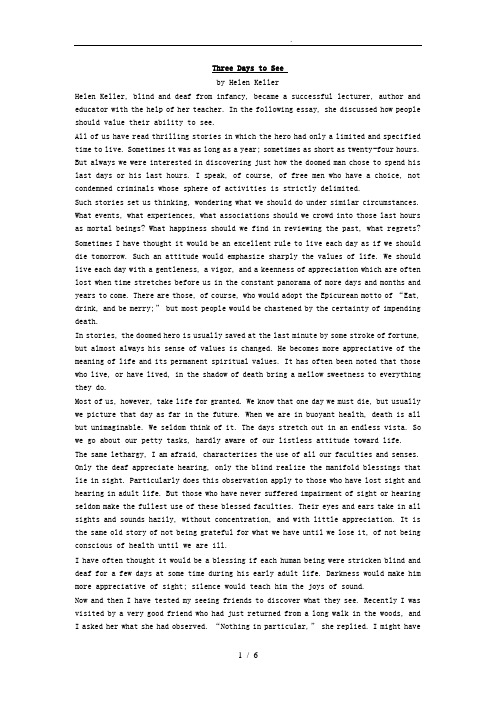
Three Days to Seeby Helen KellerHelen Keller, blind and deaf from infancy, became a successful lecturer, author and educator with the help of her teacher. In the following essay, she discussed how people should value their ability to see.All of us have read thrilling stories in which the hero had only a limited and specified time to live. Sometimes it was as long as a year; sometimes as short as twenty-four hours. But always we were interested in discovering just how the doomed man chose to spend his last days or his last hours. I speak, of course, of free men who have a choice, not condemned criminals whose sphere of activities is strictly delimited.Such stories set us thinking, wondering what we should do under similar circumstances. What events, what experiences, what associations should we crowd into those last hours as mortal beings? What happiness should we find in reviewing the past, what regrets? Sometimes I have thought it would be an excellent rule to live each day as if we should die tomorrow. Such an attitude would emphasize sharply the values of life. We should live each day with a gentleness, a vigor, and a keenness of appreciation which are often lost when time stretches before us in the constant panorama of more days and months and yea rs to come. There are those, of course, who would adopt the Epicurean motto of “Eat, drink, and be merry;” but most people would be chastened by the certainty of impending death.In stories, the doomed hero is usually saved at the last minute by some stroke of fortune, but almost always his sense of values is changed. He becomes more appreciative of the meaning of life and its permanent spiritual values. It has often been noted that those who live, or have lived, in the shadow of death bring a mellow sweetness to everything they do.Most of us, however, take life for granted. We know that one day we must die, but usually we picture that day as far in the future. When we are in buoyant health, death is all but unimaginable. We seldom think of it. The days stretch out in an endless vista. So we go about our petty tasks, hardly aware of our listless attitude toward life.The same lethargy, I am afraid, characterizes the use of all our faculties and senses. Only the deaf appreciate hearing, only the blind realize the manifold blessings that lie in sight. Particularly does this observation apply to those who have lost sight and hearing in adult life. But those who have never suffered impairment of sight or hearing seldom make the fullest use of these blessed faculties. Their eyes and ears take in all sights and sounds hazily, without concentration, and with little appreciation. It is the same old story of not being grateful for what we have until we lose it, of not being conscious of health until we are ill.I have often thought it would be a blessing if each human being were stricken blind and deaf for a few days at some time during his early adult life. Darkness would make him more appreciative of sight; silence would teach him the joys of sound.Now and then I have tested my seeing friends to discover what they see. Recently I was visited by a very good friend who had just returned from a long walk in the woods, and I asked her what she had observed. “Nothing in particular,” she replied. I might havebeen incredulous had I not been accustomed to such responses, for long ago I became convinced that the seeing see little.How was it possible, I asked myself, to walk for an hour through the woods and see nothing worthy of note? I who cannot see find hundreds of things to interest me through mere touch. I feel the delicate symmetry of a leaf. I pass my hands lovingly about the smooth skin of a silver birch, or the rough shaggy bark of a pine. In spring I touch the branches of trees hopefully in search of a bud, the first sign of awakening Nature after her winter's sleep. I feel the delightful, velvety texture of a flower, and discover its remarkable convolutions; and something of the miracle of Nature is revealed to me. Occasionally, if I am very fortunate, I place my hand gently on a small tree and feel the happy quiver of a bird in full song. I am delighted to have the cool water of a brook rush through my open fingers. To me a lush carpet of pine needles or spongy grass is more welcome than the most luxurious Persian rug. To me the pageant of seasons is a thrilling and unending drama, the action of which streams through my finger tips. At times my heart cries out with longing to see all these things. If I can get so much pleasure from mere touch, how much more beauty must be revealed by sight. Yet, those who have eyes apparently see little. The panorama of colour and action which fills the world is taken for granted. It is human, perhaps, to appreciate little that which we have and to long for that which we have not, but it is a great pity that in the world of light the gift of sight is used only as a mere convenience rather than as a means of adding fullness to life.If I were the president of a university I should establish a compulsory course in “How to Use Your Eyes”. The professor would try to show his pupils how they could add joy to their lives by really seeing what passes unnoticed before them. He would try to awake their dormant and sluggish faculties.Suppose you set your mind to work on the problem of how you would use your own eyes if you had only three more days to see. If with the oncoming darkness of the third night you knew that the sun would never rise for you again, how would you spend those three precious intervening days? What would you most want to let your gaze rest upon?I, naturally, should want most to see the things which have become dear to me through my years of darkness. You, too, would want to let your eyes rest long on the things that have become dear to you so that you could take the memory of them with you into the night that loomed before you.I should want to see the people whose kindness and gentleness and companionship have made my life worth living. First I should like to gaze long upon the face of my dear teacher, Mrs. Anne Sullivan Macy, who came to me when I was a child and opened the outer world to me. I should want not merely to see the outline of her face, so that I could cherish it in my memory, but to study that face and find in it the living evidence of the sympathetic tenderness and patience with which she accomplished the difficult tasks of my education. I should like to see in her eyes that strength of character which has enabled her to stand firm in the face of difficulties, and that compassion for all humanity which she has revealed to me so often.I do not know what it is to see into the heart of a friend through that “window of the soul”, the eye. I can only “see” through my finger tips the outline of a face. I can detect laughter, sorrow, and many other obvious emotions. I know my friends from the feel of their faces. But I cannot really picture their personalities by touch. I know their personalities, of course, through other means, through the thoughts they express to me, through whatever of their actions are revealed to me. But I am denied that deeper understanding of them which I am sure would come through sight of them through watching their reactions to various expressed thoughts and circumstances, through noting the immediate and fleeting reactions of their eyes and countenance.Friends who are near to me I know well, because through the months and years they reveal themselves to me in all their phases; but of causal friends I have only an incomplete impression, an impression gained from a handclasp, from spoken words which I take from their lips with my finger tips, or which they tap into the palm of my hand.How much easier, how much more satisfying it is for you who can see to grasp quickly the essential qualities of another person by watching the subtleties of expression, the quiver of a muscle, the flutter of a hand. But does it ever occur to you to use your sight to see into the inner nature of a friend or acquaintance? Do not most of you seeing people grasp casually the outward features of a face and let it go at that?For instance, can you describe accurately the faces of five good friends? Some of you can, but many cannot. As an experiment, I have questioned husbands of long standing about the color of their wives' eyes, and often they express embarrassed confusion and admit that they do not know. And, incidentally, it is a chronic complaint of wives that their husbands do not notice new dresses, new hats, and changes in household arrangements. The eyes of seeing persons soon become accustomed to the routine of their surroundings, and they actually see only the startling and spectacular. But even in viewing the most spectacular sights the eyes are lazy. Court records reveal every day how inaccurately “eyewitnesses” see. A given event will be “seen” in several different ways by as many witnesses. Some see more than others, but few see everything that is within the range of their vision.Oh, the things that I should see if I had the power of sight for just three days!(1634 words)译文假如我有三天光明海伦·凯勒海伦·凯勒自幼就又盲又聋,在老师的帮助下成为一名成功的讲师、作家与教育家。
第三版大学英语泛读4 lesson13

第三版大学英语泛读4 lesson13、16、22、25英译中:1、Leadership is as much a question of timing as anything else.领导艺术,与其他任何事情一样,有一个时机问题2、Great leaders are almost always great simplifiers, who cut through argument, debate and doubt to offer a solution everybody can understand and remember.伟大的领袖几乎都能做到言简意赅,他们客服争吵,辩论和犹豫彷徨,提出一个人人都能听得懂,记得住的解决方案。
3、People can only be led where they want to go. The leader follows, though a step ahead.人们只能被领向他们想去的地方。
领袖跟随着民众,虽然他先行了一步4、Above all, he must dignify our desires, convince us that we are taking part in the making of great history, give us a sense of glory about ourselves.最重要的是,他必须使我们的愿望变得神圣,使我们相信我们是在参与创造伟大的历史,赋予我们一种自我光荣感。
5、...he is, in the final analysis, the symbol of the best in us, shaped by our own spirit and will.归根究底,他(领袖)标志着我们之中的佼佼者,他是由我们自己的精神与意志塑造而成的6、He was a blind beggar, carrying the traditional battered cane, and thumping his way before him with the cautious, half-furtive effort of the sightless.他是一个盲人乞丐,手持一根老式的拐杖,不停地敲打着路面,一副盲人那种小心翼翼,畏畏缩缩的样子。
英语泛读教程4unit 2 Three Days to See课文和译文
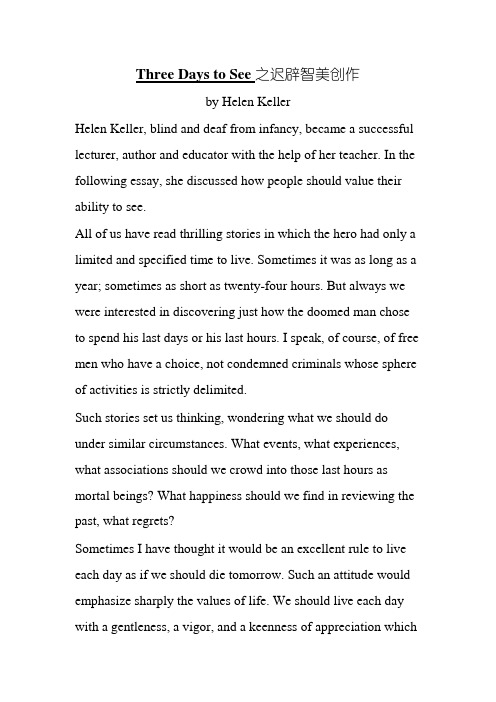
Three Days to See 之迟辟智美创作by Helen KellerHelen Keller, blind and deaf from infancy, became a successful lecturer, author and educator with the help of her teacher. In the following essay, she discussed how people should value their ability to see.All of us have read thrilling stories in which the hero had only a limited and specified time to live. Sometimes it was as long as a year; sometimes as short as twenty-four hours. But always we were interested in discovering just how the doomed man chose to spend his last days or his last hours. I speak, of course, of free men who have a choice, not condemned criminals whose sphere of activities is strictly delimited.Such stories set us thinking, wondering what we should do under similar circumstances. What events, what experiences, what associations should we crowd into those last hours as mortal beings? What happiness should we find in reviewing the past, what regrets?Sometimes I have thought it would be an excellent rule to live each day as if we should die tomorrow. Such an attitude would emphasize sharply the values of life. We should live each day with a gentleness, a vigor, and a keenness of appreciation whichare often lost when time stretches before us in the constant panorama of more days and months and years to come. There are those, of course, who would adopt the Epicurean motto of “Eat, drink, and be merry;” but most people would be chastened by the certainty of impending death.In stories, the doomed hero is usually saved at the last minute by some stroke of fortune, but almost always his sense of values is changed. He becomes more appreciative of the meaning of life and its permanent spiritual values. It has often been noted that those who live, or have lived, in the shadow of death bring a mellow sweetness to everything they do.Most of us, however, take life for granted. We know that one day we must die, but usually we picture that day as far in the future. When we are in buoyant health, death is all but unimaginable. We seldom think of it. The days stretch out in an endless vista. So we go about our petty tasks, hardly aware of our listless attitude toward life.The same lethargy, I am afraid, characterizes the use of all our faculties and senses. Only the deaf appreciate hearing, only the blind realize the manifold blessings that lie in sight. Particularly does this observation apply to those who have lost sight and hearing in adult life. But those who have never sufferedimpairment of sight or hearing seldom make the fullest use of these blessed faculties. Their eyes and ears take in all sights and sounds hazily, without concentration, and with little appreciation. It is the same old story of not being grateful for what we have until we lose it, of not being conscious of health until we are ill.I have often thought it would be a blessing if each human being were stricken blind and deaf for a few days at some time during his early adult life. Darkness would make him more appreciative of sight; silence would teach him the joys of sound.Now and then I have tested my seeing friends to discover what they see. Recently I was visited by a very good friend who had just returned from a long walk in the woods, and I asked her what she had observed. “Nothing in particular,” she replied. I might have been incredulous had I not been accustomed to such responses, for long ago I became convinced that the seeing see little.How was it possible, I asked myself, to walk for an hour through the woods and see nothing worthy of note? I who cannot see find hundreds of things to interest me through mere touch. I feel the delicate symmetry of a leaf. I pass my hands lovingly about the smooth skin of a silver birch, or the rough shaggy bark of apine. In spring I touch the branches of trees hopefully in search of a bud, the first sign of awakening Nature after her winter's sleep. I feel the delightful, velvety texture of a flower, and discover its remarkable convolutions; and something of the miracle of Nature is revealed to me. Occasionally, if I am very fortunate, I place my hand gently on a small tree and feel the happy quiver of a bird in full song. I am delighted to have the cool water of a brook rush through my open fingers. To me a lush carpet of pine needles or spongy grass is more welcome than the most luxurious Persian rug. To me the pageant of seasons is a thrilling and unending drama, the action of which streams through my finger tips.At times my heart cries out with longing to see all these things. If I can get so much pleasure from mere touch, how much more beauty must be revealed by sight. Yet, those who have eyes apparently see little. The panorama of colour and action which fills the world is taken for granted. It is human, perhaps, to appreciate little that which we have and to long for that which we have not, but it is a great pity that in the world of light the gift of sight is used only as a mere convenience rather than as a means of adding fullness to life.If I were the president of a university I should establish a compulsory course in “How to Use Your Eyes”. The professor would try to show his pupils how they could add joy to their lives by really seeing what passes unnoticed before them. He would try to awake their dormant and sluggish faculties. Suppose you set your mind to work on the problem of how you would use your own eyes if you had only three more days to see. If with the oncoming darkness of the third night you knew that the sun would never rise for you again, how would you spend those three precious intervening days? What would you most want to let your gaze rest upon?I, naturally, should want most to see the things which have become dear to me through my years of darkness. You, too, would want to let your eyes rest long on the things that have become dear to you so that you could take the memory of them with you into the night that loomed before you.I should want to see the people whose kindness and gentleness and companionship have made my life worth living. First I should like to gaze long upon the face of my dear teacher, Mrs. Anne Sullivan Macy, who came to me when I was a child and opened the outer world to me. I should want not merely to seethe outline of her face, so that I could cherish it in my memory, but to study that face and find in it the living evidence of the sympathetic tenderness and patience with which she accomplished the difficult tasks of my education. I should like to see in her eyes that strength of character which has enabled her to stand firm in the face of difficulties, and that compassion for all humanity which she has revealed to me so often.I do not know what it is to see into the heart of a friend through that “window of the soul”, the eye. I can only “see” through my finger tips the outline of a face. I can detect laughter, sorrow, and many other obvious emotions. I know my friends from the feel of their faces. But I cannot really picture their personalities by touch. I know their personalities, of course, through other means, through the thoughts they express to me, through whatever of their actions are revealed to me. But I am denied that deeper understanding of them which I am sure would come through sight of them through watching their reactions to various expressed thoughts and circumstances, through noting the immediate and fleeting reactions of their eyes and countenance.Friends who are near to me I know well, because through the months and years they reveal themselves to me in all theirphases; but of causal friends I have only an incomplete impression, an impression gained from a handclasp, from spoken words which I take from their lips with my finger tips, or which they tap into the palm of my hand.How much easier, how much more satisfying it is for you who can see to grasp quickly the essential qualities of another person by watching the subtleties of expression, the quiver of a muscle, the flutter of a hand. But does it ever occur to you to use your sight to see into the inner nature of a friend or acquaintance? Do not most of you seeing people grasp casually the outward features of a face and let it go at that?For instance, can you describe accurately the faces of five good friends? Some of you can, but many cannot. As an experiment, I have questioned husbands of long standing about the color of their wives' eyes, and often they express embarrassed confusion and admit that they do not know. And, incidentally, it is a chronic complaint of wives that their husbands do not notice new dresses, new hats, and changes in household arrangements. The eyes of seeing persons soon become accustomed to the routine of their surroundings, and they actually see only the startling and spectacular. But even in viewing the most spectacular sights the eyes are lazy. Court records reveal everyday how inaccurately “eyewitnesses” see. A given event will be “seen” in several different ways by as many witnesses. Some see more than others, but few see everything that is within the range of their vision.Oh, the things that I should see if I had the power of sight for just three days!(1634 words)译文假如我有三天光明海伦·凯勒海伦·凯勒自幼就又盲又聋,在老师的帮手下成为一名胜利的讲师、作家及教育家.在这篇文章里,海伦·凯勒讨论了人们应该怎样珍惜自己的视觉能力我们年夜家都读过这样一些惊心动魄的故事,故事中的主人公能活的时间有限而具体,或长达一年,或短至24小时.可是我们总是感兴趣的是,行将死亡的人究竟愿意怎样渡过他的最后时光.固然,我说的是能进行选择的自由人,而不是活动范围受到严格限制的囚犯.这些故事启迪我们思考,诱发我们想象,当我们处于此类情况时,该怎么做呢?作为凡人,我们在最后的时刻会急于想干些什么,体验些什么,联想些什么呢?回首往事时,我们又能领略到何种快慰,何种悔恨呢?有时我想,如果我们渡过每一天时都假定明天即将去世,这会是个极好的准则.这样的处世态度会强烈地突出身命的价值.我们会亲切地、暮气蓬勃地、感受强烈地来渡过每一天,而这一切却往往在日复一日延续的时光与岁月之中消失.固然,有些人会奉行享乐主义“吃喝玩乐”的信条,可是年夜大都人则会因死亡就在眼前而心灵获得净化.在故事中,那死神呼唤的主人公通常在最后时刻交上好运而获得拯救,但他的价值观几乎总是发生了变动.他更加珍视生命的意义及其永恒而神圣的价值.人们经常注意到,那些生活在或者曾生活在死亡的阴影下的人,对他们所做的每一件事都赋予甜美的色彩.然而,我们中间年夜大都人则把生命视为理所固然.我们知道,总有一天我们会死去,但通常我们又把那一天想象为遥远的未来.当我们身体健康时,死亡是件难以想象的事,我们几乎不会想到它.岁月无穷,因此我们忙于种种琐事,几乎意识不到我们漠然的生活态度.我们在使用感觉功能时,恐怕也持同样的冷漠态度.只有聋者才知道听觉的重要,只有盲人才理解视觉给人带来的各种恩赐.这一观点特别适用于那些在成年后才丧失视觉和听觉的人.而那些视觉和听觉从未受到损害的人,则很少充沛利用这些神圣的官能.他们的眼睛和耳朵模糊地、漫不经心地、不加欣赏地纳入所有的景象和声音.还是那句老话:工具丧失后方知珍贵,直到生病时才思健康.我经常想,如果每个人在刚成年时某个时候能失明或失聪几天,这或许将是件喜事.黑暗将使他更加珍视景象;而寂静则将教他领略声音的欢乐.我不时考一考我的有视力的朋友,以了解他们看到了什么.最近一位好朋友来看我,她是在林中溜达了好一会儿才回来的,我问她观察到了些什么.“没什么特另外工具,”她答道.要不是我对类似的反应已习以为常的话,我是会觉得难以置信的.其实,我早已深信:有视力者所见甚少.我问自己,在林中溜达了一个小时而竟未看到什么值得注意的工具,这怎么可能呢?我这个看不见工具的人,仅凭触摸就发现千百种使我感兴趣的工具.我感觉到树叶精致的对称.我用手爱抚着光滑的白烨树皮,或是粗拙的松树皮.春季里,我满怀希望地触摸树枝,寻找一个幼芽——年夜自然经过冬季觉醒重又苏醒的最初征兆.我摸着花朵上那可爱的天鹅绒般的质地,以及它那叠合巧妙的花苞,于是我领略到了某种年夜自然的神奇.偶尔,如果十分幸运的话,我把手轻轻搭在一棵小树上,能感到一只小鸟儿尽情欢歌的颤抖.我非常高兴让清凉的溪水流过我张开的手指.对我来说,那厚密的松针层或茂盛松软的草地比豪华的波斯地毯更惬意;对我来说,四季的幻化多姿宛如一出动听心弦永不尽止的戏剧,它的情节似流水从我指尖缓缓流过.我的心时时在呼号,渴望能见到所有这一切.如果我单靠触摸就能获得如此多的乐趣,那么通过视觉则能领略到更多美景!可是,那些视觉完好的人显然所见甚少.年夜千世界的五光十色与千姿百态被认为是理所固然.对已获得的不以为然,而对未获得的却期盼不已,这一点或许是人类的特性,可是,非常遗憾,在光明的世界里,天赐的视觉只被看成一种纯真的方便,而不是一种使生活日益完美的手段. 如果我是年夜学校长,我就要开设一门必修课,“如何使用你们的眼睛”.教授应尽力向学生演示,如何做到真正看见那些从他们面前不知不觉溜失落的工具,从而为自己的生活增添快乐.他将尽力唤醒他们那些昏睡懒散的感官.假定你在开动脑筋研究这一问题:如果你只有三天的视力,你将如何使用你的眼睛呢?如果你知道,当第三天的黑夜来临,太阳就永远不再为你升起,你将如何渡过这贵重的三天呢?你最想让你的目光落在何处?我固然最愿意看的,是那些在我整个失明岁月里对我已变得亲切的工具.你也会想让你的目光长久地停留在那些对你已变得亲切的工具上,这样你就可以把对它们的记忆带进那悄然而来的漫漫长夜中去.我要看看那些待我仁慈、温和、友好,从而使我的生活变得有价值的人.首先,我要好好地打量我的恩师安·沙利文·梅丝夫人的脸.她在我年幼的时候就来到我身边,替我翻开了外部世界.我不单想看她的脸形,以便能把它珍藏在我的记忆中,而且还想细细琢磨这脸容,为她那柔情与耐心找到活生生的证据,她正是怀着这种柔情与耐心完成了教育我的艰巨任务.我想在她的眼中看到那种使她坚定空中对各种困难的个性的力量,以及那种经常在我面前流露出来的对全人类的同情心.我不知道,透过"心灵之窗",即眼睛,来探视一个朋友的心是怎么回事.我只能通过我的指尖来"看"一张脸的轮廓.我能探察到欢笑、忧伤和许多其他明显的感情.我根据触摸脸庞的感觉来识别朋友,可是我简直不能靠触摸来描绘出他们的个性.固然,我通过其他手段,通过他们向我表达的思想,通过他们向我暗示出的行动来了解他们的个性.可是,我无法对他们有更深的理解,因为我确信,要到达这种更深的理解,必需要目视他们,观察他们对各种所表达的思想及情况所作的反应,留意他们眼睛里和脸上那种转瞬即逝的反应.我熟悉和我亲近的朋友,因为长年累月他们向我显露了自己的各个方面;然而对偶尔结识的朋友我只有一种不完全的印象,这种印象是仅凭一次握手,一些言语获得的.我用指尖触摸他们的嘴唇,或是靠他们叩击我的手掌而获取这些言语.相比之下,你们这些能看见的人,通过观察脸色的微妙变动、肌肉的颤抖和手的摆动来迅速地掌控他人的实质特点,就容易很多,也令人满意很多.可是,你们可曾想到要用自己的视觉去看透一个朋友或熟人的内在性格?你们这些有视觉的人中的年夜大都,不就是随便看到一张脸的外部特征就到此为止了吗?举例来说,你能准确地描绘出五个好朋友的脸形吗?你们中有些人可以,但许多人不成.作为试验,我曾向一些结婚多年的丈夫询问过他们妻子眼睛的颜色,但他们经常暗示出尴尬困惑,供认不知道.顺便提一下,妻子们老是埋怨丈夫不注意她们的新衣服、新帽子以及房间安插中的变动.有视觉的人,眼睛很快就习惯了周围的日常事物,因此他实际上只见到一些惊人的、壮观的景象.可是,哪怕是在看最壮观的局面时,他们的眼睛也是懒洋洋的.法院记录天天都标明“目击者”所见是何等地禁绝确.某一事件可能被几个目击者从几个分歧角度“看到”;有些人比他人看很多些,但几乎没有人看到他们视野之内的一切.哦,如果我能有即使仅仅三天的光明,我将能见到几多我想看到的工具啊!。
泛读4翻译
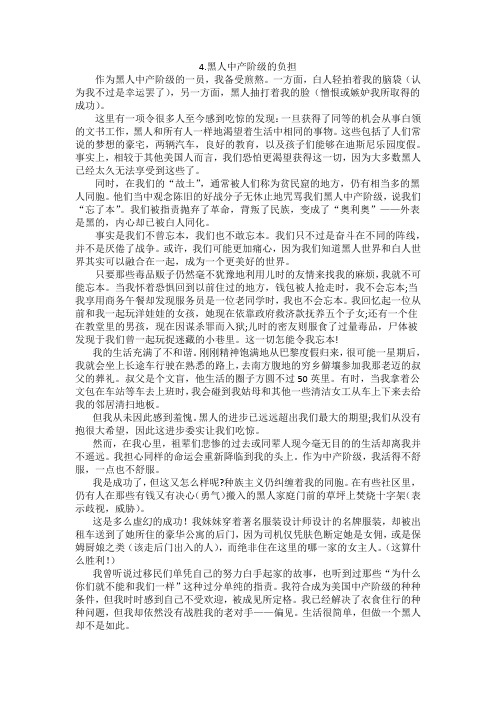
4.黑人中产阶级的负担作为黑人中产阶级的一员,我备受煎熬。
一方面,白人轻拍着我的脑袋(认为我不过是幸运罢了),另一方面,黑人抽打着我的脸(憎恨或嫉妒我所取得的成功)。
这里有一项令很多人至今感到吃惊的发现:一旦获得了同等的机会从事白领的文书工作,黑人和所有人一样地渴望着生活中相同的事物。
这些包括了人们常说的梦想的豪宅,两辆汽车,良好的教育,以及孩子们能够在迪斯尼乐园度假。
事实上,相较于其他美国人而言,我们恐怕更渴望获得这一切,因为大多数黑人已经太久无法享受到这些了。
同时,在我们的“故土”,通常被人们称为贫民窟的地方,仍有相当多的黑人同胞。
他们当中观念陈旧的好战分子无休止地咒骂我们黑人中产阶级,说我们“忘了本”。
我们被指责抛弃了革命,背叛了民族,变成了“奥利奥”——外表是黑的,内心却已被白人同化。
事实是我们不曾忘本,我们也不敢忘本。
我们只不过是奋斗在不同的阵线,并不是厌倦了战争。
或许,我们可能更加痛心,因为我们知道黑人世界和白人世界其实可以融合在一起,成为一个更美好的世界。
只要那些毒品贩子仍然毫不犹豫地利用儿时的友情来找我的麻烦,我就不可能忘本。
当我怀着恐惧回到以前住过的地方,钱包被人抢走时,我不会忘本;当我享用商务午餐却发现服务员是一位老同学时,我也不会忘本。
我回忆起一位从前和我一起玩洋娃娃的女孩,她现在依靠政府救济款抚养五个子女;还有一个住在教堂里的男孩,现在因谋杀罪而入狱;儿时的密友则服食了过量毒品,尸体被发现于我们曾一起玩捉迷藏的小巷里。
这一切怎能令我忘本!我的生活充满了不和谐。
刚刚精神饱满地从巴黎度假归来,很可能一星期后,我就会坐上长途车行驶在熟悉的路上,去南方腹地的穷乡僻壤参加我那老迈的叔父的葬礼。
叔父是个文盲,他生活的圈子方圆不过50英里。
有时,当我拿着公文包在车站等车去上班时,我会碰到我姑母和其他一些清洁女工从车上下来去给我的邻居清扫地板。
但我从未因此感到羞愧。
黑人的进步已远远超出我们最大的期望;我们从没有抱很大希望,因此这进步委实让我们吃惊。
大学英语泛读教程第四册全文翻译
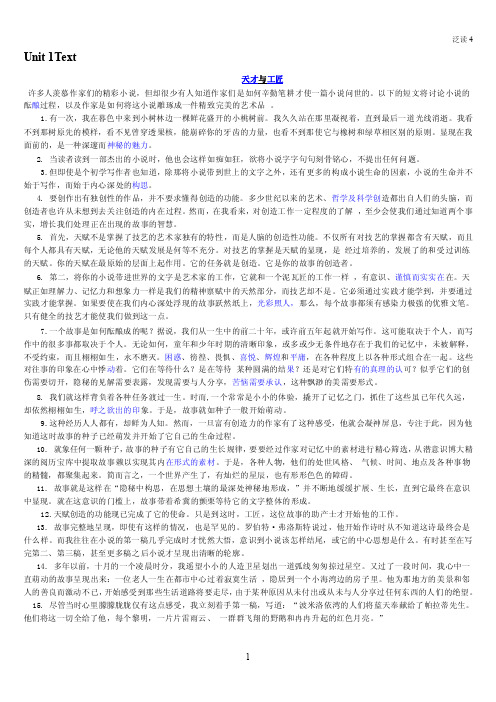
Unit 1Text天才与工匠许多人羡慕作家们的精彩小说,但却很少有人知道作家们是如何辛勤笔耕才使一篇小说问世的。
以下的短文将讨论小说的酝酿过程,以及作家是如何将这小说雕琢成一件精致完美的艺术品。
1.有一次,我在暮色中来到小树林边一棵鲜花盛开的小桃树前。
我久久站在那里凝视着,直到最后一道光线消逝。
我看不到那树原先的模样,看不见曾穿透果核,能崩碎你的牙齿的力量,也看不到那使它与橡树和绿草相区别的原则。
显现在我面前的,是一种深邃而神秘的魅力。
2. 当读者读到一部杰出的小说时,他也会这样如痴如狂,欲将小说字字句句刻骨铭心,不提出任何问题。
3.但即使是个初学写作者也知道,除那将小说带到世上的文字之外,还有更多的构成小说生命的因素,小说的生命并不始于写作,而始于内心深处的构思。
4. 要创作出有独创性的作品,并不要求懂得创造的功能。
多少世纪以来的艺术、哲学及科学创造都出自人们的头脑,而创造者也许从未想到去关注创造的内在过程。
然而,在我看来,对创造工作一定程度的了解,至少会使我们通过知道两个事实,增长我们处理正在出现的故事的智慧。
5. 首先,天赋不是掌握了技艺的艺术家独有的特性,而是人脑的创造性功能。
不仅所有对技艺的掌握都含有天赋,而且每个人都具有天赋,无论他的天赋发展是何等不充分。
对技艺的掌握是天赋的显现,是经过培养的,发展了的和受过训练的天赋。
你的天赋在最原始的层面上起作用。
它的任务就是创造。
它是你的故事的创造者。
6. 第二,将你的小说带进世界的文字是艺术家的工作,它就和一个泥瓦匠的工作一样,有意识、谨慎而实实在在。
天赋正如理解力、记忆力和想象力一样是我们的精神禀赋中的天然部分,而技艺却不是。
它必须通过实践才能学到,并要通过实践才能掌握。
如果要使在我们内心深处浮现的故事跃然纸上,光彩照人,那么,每个故事都须有感染力极强的优雅文笔。
泛读英语第四册unit2课文及翻译
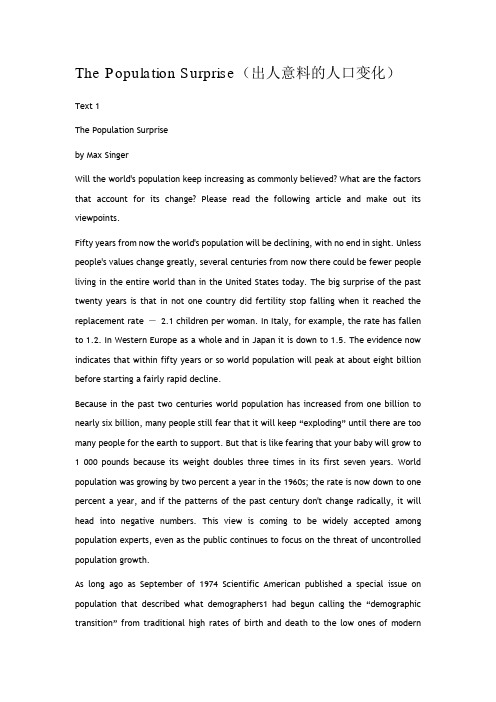
The Population Surprise(出人意料的人口变化)Text 1The Population Surpriseby Max SingerWill the world's population keep increasing as commonly believed? What are the factors that account for its change? Please read the following article and make out its viewpoints.Fifty years from now the world's population will be declining, with no end in sight. Unless people's values change greatly, several centuries from now there could be fewer people living in the entire world than in the United States today. The big surprise of the past twenty years is that in not one country did fertility stop falling when it reached the replacement rate -2.1 children per woman. In Italy, for example, the rate has fallen to 1.2. In Western Europe as a whole and in Japan it is down to 1.5. The evidence now indicates that within fifty years or so world population will peak at about eight billion before starting a fairly rapid decline.Because in the past two centuries world population has increased from one billion to nearly six billion, many people still fear that it will keep “exploding” until there are too many people for the earth to support. But that is like fearing that your baby will grow to 1 000 pounds because its weight doubles three times in its first seven years. World population was growing by two percent a year in the 1960s; the rate is now down to one percent a year, and if the patterns of the past century don't change radically, it will head into negative numbers. This view is coming to be widely accepted among population experts, even as the public continues to focus on the threat of uncontrolled population growth.As long ago as September of 1974 Scientific American published a special issue on population that described what demographers1 had begun calling the “demographic transition” from traditional high rates of birth and death to the low ones of modernsociety. The experts believed that birth and death rates would be more or less equal in the future, as they had been in the past, keeping total population stable after a level of 10-12 billion people was reached during the transition.Developments over the past twenty years show that the experts were right in thinking that population won't keep going up forever. They were wrong in thinking that after it stops going up, it will stay level. The experts' assumption that population would stabilize because birth rates would stop falling once they matched the new low death rates has not been borne out by experience. Evidence from more than fifty countries demonstrates what should be unsurprising: in a modern society the death rate doesn't determine the birth rate. If in the long run birth rates worldwide do not conveniently match death rates, then population must either rise or fall, depending on whether birth or death rates are higher. Which can we expect?The rapid increase in population during the past two centuries has been the result of lower death rates, which have produced an increase in worldwide life expectancy2 from about thirty to about sixty-two. (Since the maximum -if we do not change fundamental human physiology -is about eighty-five, the world has already gone three fifths as far as it can in increasing life expectancy.) For a while the result was a young population with more mothers in each generation, and fewer deaths than births. But even during this population explosion the average number of children born to each woman -the fertility rate -has been falling in modernizing societies. The prediction that world population will soon begin to decline is based on almost universal human behavior. In the United States fertility has been falling for 200 years (except for the blip of the Baby Boom3), but partly because of immigration it has stayed only slightly below replacement level for twenty-five years.Obviously, if for many generations the birth rate averages fewer than 2.1 children per woman, population must eventually stop growing. Recently the United Nations Population Division estimated that 44 percent of the world's people live in countries where the fertility rate has already fallen below the replacement rate, and fertility is falling fast almost everywhere else. In Sweden and Italy fertility has been belowreplacement level for so long that the population has become old enough to have more deaths than births. Declines in fertility will eventually increase the average age in the world, and will cause a decline in world population forty to fifty years from now. Because in a modern society the death rate and the fertility rate are largely independent of each other, world population need not be stable. World population can be stable only if fertility rates around the world average out to 2.1 children per woman. But why should they average 2.1, rather than 2.4, or 1.8, or some other number? If there is nothing to keep each country exactly at 2.1, then there is nothing to ensure that the overall average will be exactly 2.1.The point is that the number of children born depends on families' choices about how many children they want to raise. And when a family is deciding whether to have another child, it is usually thinking about things other than the national or the world population. Who would know or care if world population were to drop from, say, 5.85 billion to 5.81 billion? Population change is too slow and remote for people to feel in their lives -even if the total population were to double or halve in only a century. Whether world population is increasing or decreasing doesn't necessarily affect the decisions that determine whether it will increase or decrease in the future. As the systems people would say, there is no feedback loop.What does affect fertility is modernity. In almost every country where people have moved from traditional ways of life to modern ones, they are choosing to have too few children to replace themselves. This is true in Western and in Eastern countries, in Catholic and in secular societies. And it is true in the richest parts of the richest countries. The only exceptions seem to be some small religious communities. We can't be sure what will happen in Muslim countries4, because few of them have become modern yet, but so far it looks as if their fertility rates will respond to modernity as others' have.Nobody can say whether world population will ever dwindle to very low numbers; that depends on what values people hold in the future. After the approaching peak, as long as people continue to prefer saving effort and money by having fewer children, populationwill continue to decline. (This does not imply that the decision to have fewer children is selfish; it may, for example, be motivated by a desire to do more for each child.) Some people may have values significantly different from those of the rest of the world, and therefore different fertility rates. If such people live in a particular country or population group, their values can produce marked changes in the size of that country or group, even as world population changes only slowly. For example, the U.S. population, because of immigration and a fertility rate that is only slightly below replacement level, is likely to grow from 4.5 percent of the world today to 10 percent of a smaller world over the next two or three centuries. Much bigger changes in share are possible for smaller groups if they can maintain their difference from the average for a long period of time. (To illustrate: Korea's population could grow from one percent of the world to 10 percent in a single lifetime if it were to increase by two percent a year while the rest of the world population declined by one percent a year.)World population won't stop declining until human values change. But human values may well change -values, not biological imperatives, are the unfathomable variable in population predictions. It is quite possible that in a century or two or three, when just about the whole world is at least as modern as Western Europe is today, people will start to value children more highly than they do now in modern societies. If they do, and fertility rates start to climb, fertility is no more likely to stop climbing at an average rate of 2.1 children per woman than it was to stop falling at 2.1 on the way down.In only the past twenty years or so world fertility has dropped by 1.5 births per woman. Such a degree of change, were it to occur again, would be enough to turn a long-term increase in world population of one percent a year into a long-term decrease of one percent a year. Presumably fertility could someday increase just as quickly as it has declined in recent decades, although such a rapid change will be less likely once the world has completed the transition to modernity. If fertility rises only to 2.8, just 33 percent over the replacement rate, world population will eventually grow by one percent a year again -doubling in seventy years and multiplying by twenty in only three centuries.The decline in fertility that began in some countries, including the United States, in the past century is taking a long time to reduce world population because when it started, fertility was very much higher than replacement level. In addition, because a preference for fewer children is associated with modern societies, in which high living standards make time valuable and children financially unproductive and expensive to care for and educate, the trend toward lower fertility couldn't spread throughout the world until economic development had spread. But once the whole world has become modern, with fertility everywhere in the neighborhood of replacement level, new social values might spread worldwide in a few decades. Fashions in families might keep changing, so that world fertility bounced above and below replacement rate. If each bounce took only a few decades or generations, world population would stay within a reasonable narrow range -although probably with a long-term trend in one direction or the other.The values that influence decisions about having children seem, however, to change slowly and to be very widespread. If the average fertility rate were to take a long time to move from well below to well above replacement rate and back again, trends in world population could go a long way before they reversed themselves. The result would be big swings in world population -perhaps down to one or two billion and then up to 20 to 40 billion.Whether population swings are short and narrow or long and wide, the average level of world population after several cycles will probably have either an upward or a downward trend overall. Just as averaging across the globe need not result in exactly 2.1 children per woman, averaging across the centuries need not result in zero growth rather than a slowly increasing or slowly decreasing world population. But the long-term trend is less important than the effects of the peaks and troughs5 . The troughs could be so low that human beings become fewer than they were in ancient times. The peaks might cause harm from some kinds of shortages.One implication is that not even very large losses from disease or war can affect the world population in the long run nearly as much as changes in human values do. What we have learned from the dramatic changes of the past few centuries is that regardless ofthe size of the world population at any time, people's personal decisions about how many children they want can make the world population go anywhere -to zero or to 100 billion or more.(1916words)课文一出人意料的人口变化马克斯·辛格世界人口会象人们通常认为的那样持续增长吗?造成人口变化的因素是什么?请阅读下面的文章,并弄清其观点。
大英四泛读翻译大英4泛读翻译Book4
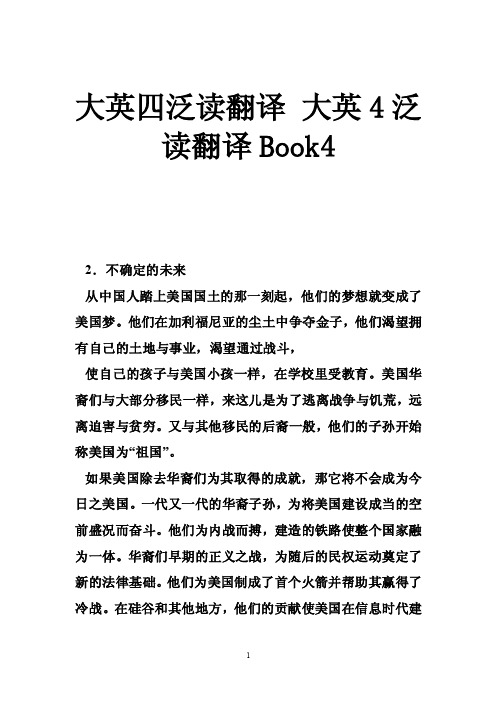
大英四泛读翻译大英4泛读翻译Book42.不确定的未来从中国人踏上美国国土的那一刻起,他们的梦想就变成了美国梦。
他们在加利福尼亚的尘土中争夺金子,他们渴望拥有自己的土地与事业,渴望通过战斗,使自己的孩子与美国小孩一样,在学校里受教育。
美国华裔们与大部分移民一样,来这儿是为了逃离战争与饥荒,远离迫害与贫穷。
又与其他移民的后裔一般,他们的子孙开始称美国为“祖国”。
如果美国除去华裔们为其取得的成就,那它将不会成为今日之美国。
一代又一代的华裔子孙,为将美国建设成当的空前盛况而奋斗。
他们为内战而搏,建造的铁路使整个国家融为一体。
华裔们早期的正义之战,为随后的民权运动奠定了新的法律基础。
他们为美国制成了首个火箭并帮助其赢得了冷战。
在硅谷和其他地方,他们的贡献使美国在信息时代建立并保持其优势地位。
今天这些华裔分散在每个我们可想象的行业中:有投资者,教师,作者,医生,工程师,律师,首席执行官,社会工作者,会计,建筑师,警察,消防员,演员和宇航员。
可悲的是,尽管这么长时间的贡献,许多华裔在美国仍然被当成外国人。
大部分新移民者将会遭遇这样的嘲笑:“从哪儿来回哪儿去吧!”就像有人说的,美国华裔们就像客人一样呆在其他人屋子里,不能将脚放在桌子上,不能得到真正的放松。
中式口音与文化传统可能会消失,但我们的皮肤颜色与眼睛形状却无法改变。
这些特性让一些人理所当然地将美国华人视为异类,自然也就称不上是纯正的美国人了。
美国大众媒体把美国华人模式化,把他们描绘成与生俱来就与美国人不同,无法改变。
因而美国华人的美国化被这种轻而易举但带有欺骗性的模式化蒙上了阴影。
用人类的观点来看,什么是造成这种不和的因素呢?一个在加利福尼亚洲,西柯汶纳的本地委员会成员,有人在电话里对他说:“哇,你完全就像一个真正的美国人,一点儿都没有中式口音。
”医学电视剧中美籍华人医生不多,事实上,美国每六个医生中就有一个是亚裔美国人。
1999年6月,刘云平出生于俄亥俄州,在加利福尼亚读大学,在华盛顿邮报上介绍了他做美国空军上尉时的一个小故事:“你是中国空军吗?”旁边一位穿着得体的女士问道。
大学英语4翻译、cloze、泛读

Unit 3Sentence translation1.食物供应还不足以应付饥民的需求。
(inadequate)1. The food supplies are inadequate to meet the needs of the hungry.2. 只要我们竭尽全力做到最好,我们就能掌握未来。
(endeavor, in our hands)2. As long as we endeavor to do our best, we can have the future in our hands.3我要事先告诉你,录用者需要经常出差去寻找我们的潜在客户。
(beforehand,prospective) 3. I should tell you beforehand that successful applicants will be expected to travel extensively to find our prospective customers.4. 父亲反复追问小男孩为什么把钉子钉进那么昂贵的画中。
(grill, hammer)4. The little boy was grilled by his father why he hammered the nail into that expensive painting.5. 俗话说,选择比努力更重要。
在我看来,凡事事先做好准备,那么成功就是可以预见的。
(as I see it, do one’s homework)5. As the saying goes, the choice is more important than efforts. As I see it, always to do my homework, then success is predictable.参考译文Passage translation常言道,好的开端是成功的一半。
英语泛读教程4__课文翻译

第一单元第一篇"Good words cost nothing, but are worth much,"said Thomas Fuller,the 17th century British scholar.“良言不费分文,但价值甚大,”托马斯说丰满,17th世纪英国学者。
They serve to give encouragement and smooth away differences and misunderstandings, as this article explains.他们服役给予鼓励和克服差异和误解,因为这篇文章解释了。
"Maybe when I'm a hundred,I'll get used to having everything I do taken for granted,"a young homemaker confided to her neighbor.“也许当我一百岁时,我就会习惯吃我做的一切视为理所当然,”一个年轻的家庭主妇被任命她的邻居。
"If Bill would compliment me once in a while, he'd make my life much happier."“如果法案恭维我,偶尔也好,他会使我的生活更幸福。
”Few of us realize how much we need encouragement.我们很少有人意识到我们是多么需要鼓励的。
Yet we must bask in the warmth of approval now and then or lose our self-confidence.但是我们仍然必须沐浴在温暖的批准,否则现在失去自己的自信。
All of us need to feel needed and admired.我们都需要去感觉需要和赞赏。
大学英语4泛读翻译第十课
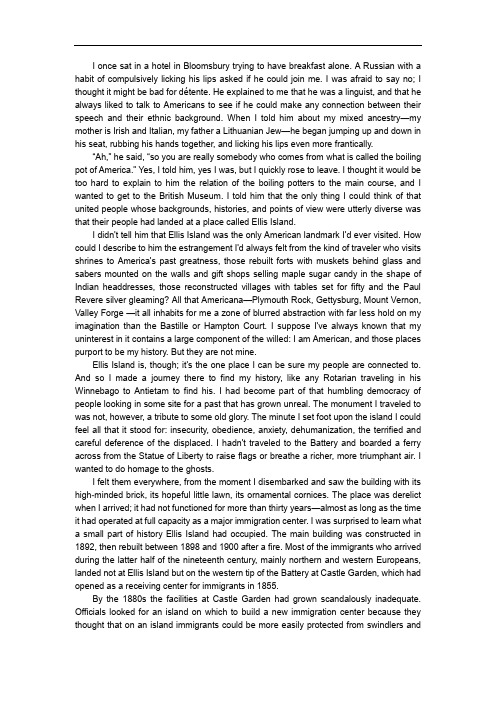
I once sat in a hotel in Bloomsbury trying to have breakfast alone. A Russian with a habit of compulsively licking his lips asked if he could join me. I was afraid to say no; I thought it might be bad for détente. He explained to me that he was a linguist, and that he always liked to talk to Americans to see if he could make any connection between their speech and their ethnic background. When I told him about my mixed ancestry—my mother is Irish and Italian, my father a Lithuanian Jew—he began jumping up and down in his seat, rubbing his hands together, and licking his lips even more frantically.“Ah,” he said, “so you are really somebody who comes from what is called the boiling pot of America.” Yes, I told him, yes I was, but I quickly rose to leave. I thought it would be too hard to explain to him the relation of the boiling potters to the main course, and I wanted to get to the British Museum. I told him that the only thing I could think of that united people whose backgrounds, histories, and points of view were utterly diverse was that their people had landed at a place called Ellis Island.I didn't tell him that Ellis Island was the only American landmark I'd ever visited. How could I describe to him the estrangement I'd always felt from the kind of traveler who visits shrines to America's past greatness, those rebuilt forts with muskets behind glass and sabers mounted on the walls and gift shops selling maple sugar candy in the shape of Indian headdresses, those reconstructed villages with tables set for fifty and the Paul Revere silver gleaming?All that Americana—Plymouth Rock, Gettysburg, Mount Vernon, Valley Forge —it all inhabits for me a zone of blurred abstraction with far less hold on my imagination than the Bastille or Hampton Court. I suppose I've always known that my uninterest in it contains a large component of the willed: I am American, and those places purport to be my history. But they are not mine.Ellis Island is, though; it's the one place I can be sure my people are connected to. And so I made a journey there to find my history, like any Rotarian traveling in his Winnebago to Antietam to find his. I had become part of that humbling democracy of people looking in some site for a past that has grown unreal. The monument I traveled to was not, however, a tribute to some old glory. The minute I set foot upon the island I could feel all that it stood for: insecurity, obedience, anxiety, dehumanization, the terrified and careful deferenceof the displaced. I hadn't traveled to the Battery and boarded a ferry across from the Statue of Liberty to raise flags or breathe a richer, more triumphant air. I wanted to do homage to the ghosts.I felt them everywhere, from the moment I disembarked and saw the building with its high-minded brick, its hopeful little lawn, its ornamental cornices. The place was derelict when I arrived; it had not functioned for more than thirty years—almost as long as the time it had operated at full capacity as a major immigration center. I was surprised to learn what a small part of history Ellis Island had occupied. The main building was constructed in 1892, then rebuilt between 1898 and 1900 after a fire. Most of the immigrants who arrived during the latter half of the nineteenth century, mainly northern and western Europeans, landed not at Ellis Island but on the western tip of the Battery at Castle Garden, which had opened as a receiving center for immigrants in 1855.By the 1880s the facilities at Castle Garden had grown scandalously inadequate. Officials looked for an island on which to build a new immigration center because they thought that on an island immigrants could be more easily protected from swindlers andquickly transported to railroad terminals in New Jersey. Bedloe's Island was considered, but New Yorkers were aghast at the idea of a “Babel” ruining their beautiful new treasure, “Liberty Enlightening the World.” The statue's sculptor, Frederic Auguste Bartholdi, reacted to the prospect of immigrants landing near his masterpiece in horror; he called it a “monstrous plan.”So much for Emma Lazarus.Ellis Island was finally chosen because the citizens of New Jersey petitioned the federal government to remove from the island an old naval powder magazine that they thought dangerously close to the Jersey shore. The explosives were removed; no one wanted the island for anything. It was the perfect place to build an immigration center.I thought about the island's history as I walked into the building and made my way to the room that was the center in my imagination of the Ellis Island experience: the Great Hall. It had been made real for me in the stark, accusing photographs of Louis Hine and others who took those pictures to make a point. It was in the Great Hall that everyone had waited—waiting, always, the great vocation of the dispossessed. The room was empty, except for me and a handful of other visitors and the park ranger who showed us around. I felt myself grow insignificant in that room, with its huge semicircular windows, its air, even in dereliction, of solid and official probity.I walked in the deathlike expansiveness of the room's disuse and tried to think of what it might have been like, filled and swarming. More than sixteen million immigrants came through that room; approximately 250,000 were rejected. Not really a large proportion, but the implications for the rejected were dreadful. For some, there was nothing to go back to, or there was certain death; for others, who left as adventurers, to return would be to adopt in local memory the fool's role and the failure's. No wonder that the island's history includes reports of three thousand suicides.Sometimes immigrants could pass through Ellis Island in mere hours, though for some the process took days. The particulars of the experience in the Great Hall were often influenced by the political events and attitudes on the mainland. In the 1890s and the first years of the new century, when cheap labor was needed, the newly built receiving center took in its immigrants with comparatively little question. But as the century progressed, the economy worsened, eugenics became both scientifically respectable and popular, and World War I made American xenophobia seem rooted in fact.Immigration acts were passed; newcomers had to prove, besides moral correctness and financial solvency, their ability to read. Quota laws came into effect, limiting the number of immigrants from southern and eastern Europe to less than 14 percent of the total quota. Intelligence tests were biased against all non-English-speaking persons and medical examinations became increasingly strict, until the machinery of immigration nearly collapsed under its own weight. The Second Quota Law of 1924 provided that all immigrants be inspected and issued visas at American consular offices in Europe, rendering the center almost obsolete.On the day of my visit, my mind fastened upon the medical inspections, which had always seemed to me most emblematic of the ignominy and terror the immigrants endured. The medical inspectors, sometimes dressed in uniforms like soldiers, were particularly obsessed with a disease of the eyes called trachoma, which they checked for by flipping back the immigrants' top eyelids with a hook used for buttoning gloves—amethod that sometimes resulted in the transmission of the disease to healthy people. Mothers feared that if their children cried too much, their red eyes would be mistaken for a symptom of the disease and the whole family would be sent home. Those immigrants suspected of some physical disability had initials chalked on their coats. I remembered the photographs I'd seen of people standing, dumbstruck and innocent as cattle, with their manifest numbers hung around their necks and initials marked in chalk upon their coats: “E” for eye trouble, “K” for hernia, “L” for lameness, “X” for mental defects, “H” for heart disease.I thought of my grandparents as I stood in the room; my seventeen-year-old grandmother, coming alone from Ireland in 1896, vouched for by a stranger who had found her a place as a domestic servant to some Irish who had done well. I tried to imagine the assault it all must have been for her; I've been to her hometown, a collection of farms with a main street—smaller than the athletic field of my local public school. She must have watched the New York skyline as the first- and second-class passengers were whisked off the gangplank with the most cursory of inspections while she was made to board a ferry to the new immigration center.What could she have made of it—this buff-painted wooden structure with its towers and its blue slate roof, a place Harper's Weekly described as “a latter-day watering place hotel”? It would have been the first time she'd have heard people speaking some thing other than English. She would have mingled with people carrying baskets on their heads and eating foods unlike any she had ever seen—dark-eyed people, like the Sicilian she would marry ten years later, who came over with his family, responsible even then for his mother and sister. I don't know what they thought, my grandparents, for they were not expansive people, nor romantic; they didn't like to think of what they called “the hard times,” and their trip across the ocean was the single adventurous ac t of lives devoted after landing to security, respectability, and fitting in.What is the potency of Ellis Island for someone like me—an American, obviously, but one who has always felt that the country really belonged to the early settlers, that, as J. F. Powers wrote in “MorteD'Urban,” it had been “handed down to them by the Pilgrims, George Washington and others, and that they were taking a risk in letting you live in it.” I have never been the victim of overt discrimination; nothing I have wanted has be en denied me because of the accidents of blood. But I suppose it is part of being an American to be engaged in a somewhat tiresome but always self-absorbingprocess of national definition. And in this process, I have found in traveling to Ellis Island an important piece of evidence that could remind me I was right to feel my differentness. Something had happened to my people on that island, a result of the eternal wrongheadedness of American protectionism and the predictabilities of simple greed. I came to the island, too, so I could tell the ghosts that I was one of them, and that I honored them—their stoicism, and their innocence, the fear that turned them inward, and their pride. I wanted to tell them that I liked them better than the Americans who made them pass through the Great Hall and stole their names and chalked their weaknesses in public on their clothing. And to tell the ghosts what I have always thought: that American history was a very classy party that was not much fun until they arrived, brought the good food, turned up the music, and taught everyone to dance.一次我一个人坐在Bloomsbury的一家旅馆里吃早餐时,一个有着强制性舔嘴唇习惯的俄国人问是否能和我一起吃。
大学英语泛读教程第四册全文翻译..
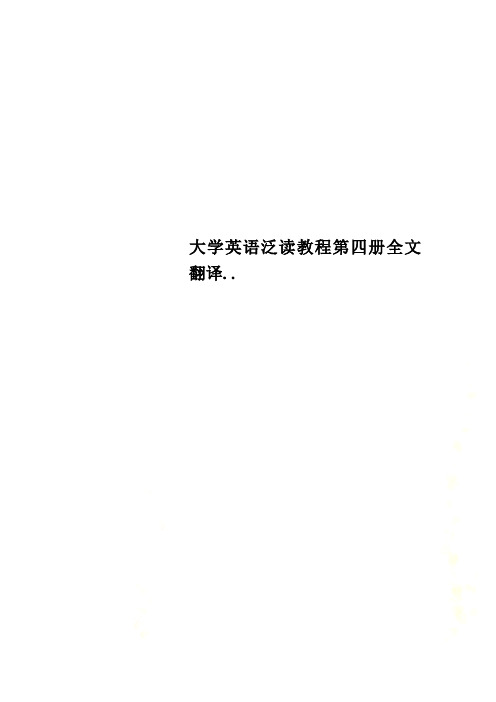
大学英语泛读教程第四册全文翻译..Unit 1Text天才与工匠许多人羡慕作家们的精彩小说,但却很少有人知道作家们是如何辛勤笔耕才使一篇小说问世的。
以下的短文将讨论小说的酝酿过程,以及作家是如何将这小说雕琢成一件精致完美的艺术品。
1.有一次,我在暮色中来到小树林边一棵鲜花盛开的小桃树前。
我久久站在那里凝视着,直到最后一道光线消逝。
我看不到那树原先的模样,看不见曾穿透果核,能崩碎你的牙齿的力量,也看不到那使它与橡树和绿草相区别的原则。
显现在我面前的,是一种深邃而神秘的魅力。
2. 当读者读到一部杰出的小说时,他也会这样如痴如狂,欲将小说字字句句刻骨铭心,不提出任何问题。
3.但即使是个初学写作者也知道,除那将小说带到世上的文字之外,还有更多的构成小说生命的因素,小说的生命并不始于写作,而始于内心深处的构思。
4. 要创作出有独创性的作品,并不要求懂得创造的功能。
多少世纪以来的艺术、哲学及科学创造都出自人们的头脑,而创造者也许从未想到去关注创造的内在过程。
然而,在我看来,对创造工作一定程度的了解,至少会使我们通过知道两个事实,增长我们处理正在出现的故事的智慧。
5. 首先,天赋不是掌握了技艺的艺术家独有的特性,而是人脑的创造性功能。
不仅所有对技艺的掌握都含有天赋,而且每个人都具有天赋,无论他的天赋发展是何等不充分。
对技艺的掌握是天赋的显现,是经过培养的,发展了的和受过训练的天赋。
你的天赋在最原始的层面上起作用。
它的任务就是创造。
它是你的故事的创造者。
6. 第二,将你的小说带进世界的文字是艺术家的工作,它就和一个泥瓦匠的工作一样,有意识、谨慎而实实在在。
天赋正如理解力、记忆力和想象力一样是我们的精神禀赋中的天然部分,而技艺却不是。
它必须通过实践才能学到,并要通过实践才能掌握。
如果要使在我们内心深处浮现的故事跃然纸上,光彩照人,那么,每个故事都须有感染力极强的优雅文笔。
只有健全的技艺才能使我们做到这一点。
7.一个故事是如何酝酿成的呢?据说,我们从一生中的前二十年,或许前五年起就开始写作。
泛读 第4课 译

college english extensive readingtranslate1、His feet sank deep into the snow at every step and he could pull them out only with great difficulty.他的脚深陷雪中每走一步都要很困难的把脚拨出。
2、He paid so much attention to the content of the letters that he did not catch the dates were different.我不花了很多的注意力在信的内容上也至于他没发现日期是不同的。
3、Suddenly he found himself in the complete darkness of night. He had no strength left to collect firewood.突然他发现自己完全处在夜的黑暗中,他没有力气离开去收集柴火。
4、He would have to make his way through thick bushes, for he was not likely to meet with any help at all.他只有用他自己的方式穿过厚厚的灌木丛,因为他不可能遇到任何的帮助。
5、If you catch a train. it is always better to be comfortable early than even a fraction of a minute too late.如果你能赶上火车。
早点到总是比晚到一会要好。
6、His job as a photojournalist has taken him all over the world and placed him in danger countless times.作为一名摄影记者他已经被无数次的派到世界各地的危险时刻进行采访。
大学英语精读第四册课后翻译

大学英语精读第四册课后翻译UNIT11.我们接到通知,财政部长将于次日接见我们。
We were informed that the Minister of Finance was to give us an audience / receive us the next day.2.我觉得很奇怪,他似乎不记得自己的生日。
I thought it odd that he didn’t seem to remember his own birthday.3.学期论文最迟在下星期二交来,可是至今大部分学生却几无进展。
Next Tuesday is the deadline for handing in the term papers, but most students have hardly made a dent in the work so far.4.看到学生人数不断减少,校长心里很难受。
(pain)It pained the headmaster to find the number of students shrinking.5.在那个国家一般用现金付账,但支票变得普遍起来了,不久会代替现金作为人们结账的一种方式。
Cash is commonly used in paying bills in that country, but checks are becoming more popular and will, in a short while, replace cash as a way for people to settle their accounts.6.该公司声称,这条河流的污染不是它造成的。
The company claims that it is not responsible for the pollution in the river.UNIT21.比尔已是个成熟的小伙子,不再依赖父母替他做主。
大英四泛读课文翻译
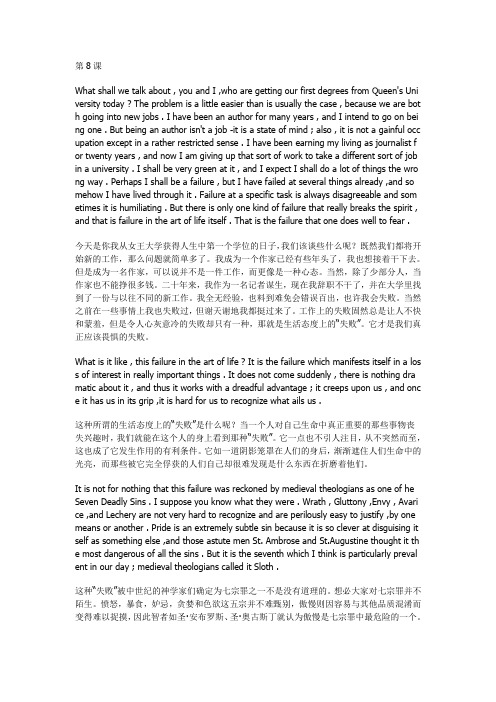
第8课What shall we talk about , you and I ,who are getting our first degrees from Queen's Uni versity today ? The problem is a little easier than is usually the case , because we are bot h going into new jobs . I have been an author for many years , and I intend to go on bei ng one . But being an author isn't a job -it is a state of mind ; also , it is not a gainful occ upation except in a rather restricted sense . I have been earning my living as journalist f or twenty years , and now I am giving up that sort of work to take a different sort of job in a university . I shall be very green at it , and I expect I shall do a lot of things the wro ng way . Perhaps I shall be a failure , but I have failed at several things already ,and so mehow I have lived through it . Failure at a specific task is always disagreeable and som etimes it is humiliating . But there is only one kind of failure that really breaks the spirit , and that is failure in the art of life itself . That is the failure that one does well to fear .今天是你我从女王大学获得人生中第一个学位的日子,我们该谈些什么呢?既然我们都将开始新的工作,那么问题就简单多了。
- 1、下载文档前请自行甄别文档内容的完整性,平台不提供额外的编辑、内容补充、找答案等附加服务。
- 2、"仅部分预览"的文档,不可在线预览部分如存在完整性等问题,可反馈申请退款(可完整预览的文档不适用该条件!)。
- 3、如文档侵犯您的权益,请联系客服反馈,我们会尽快为您处理(人工客服工作时间:9:00-18:30)。
Food Fight
1. Over the past decade, genetically modified (GM) food has become an increasingly common phenomenon as scientists have rewoven the genes of countless fruits and vegetables, turning everyday crops into über-crops able to resist frost, withstand herbicides and even produce their own pesticides.
(过去二十年最令人吃惊的事情是,没有一个国家当其出生率降到人口置换率水平时——每个妇女生育2.1个子女——就停止下降了。)
2. World population was growing by two percent a year in the 1960s; the rate is now down to one percent a year, and if the patterns of the past century don't change radically, it will head into negative numbers.
(时而,一个小小的体验撬开了记忆之门,抓住了这些虽已年代久远,却依然栩栩如生,呼之欲出的印象。)
12. letting it cool in between times
(在将其搁置一旁冷一段时间)
13. No matter how far short of the mark you fall, it is never failure…
(如果要使在我们内心深处浮现的故事跃然纸上,并光彩照人,那么,每个故事都须有感染力极强的优雅文笔。只有功底深厚的技艺才能使我们做到这一点。)
8. …it may depend on the individual, as so much does in writing.
(这可能取决于个人,而写作中很多事都取决于个人。)
(基因作物种子售出的总值从1995年的七百五十万增加到去年的十亿五千万,并且他们生产的作物不仅出现在直接生产的产品中而且出现在加工食品中,从饼干到薯条到婴儿食品。)
3. But many people question whether it's a good idea for fallible human beings to go mucking about with the genes of other species.
(只有世界范围内的出生率能达到平均每位妇女生育2.1个子女,世界人口才可能稳定。)
7. Much bigger changes in share are possible for smaller groups if they can maintrage for a long period of time.
(在六十年代,世界人口每年只增长2%,现在这一比率已降到每年1%。而且要不是上个世纪[19世纪]生育模式发生了根本性变化的话,这将会导致人口的负增长。)
3. As long ago as September of 1974 Scientific American published a special issue on population that described what demographers had begun calling the "demographic transition" from traditional high rates of birth and death to the low ones of modern society.
(他们说如果实验室里的科学实验做错了,那是一回事。但如果它最终出现在你的饭桌上,那又是另外一回事。)
5. While that may be, the fact remains that the U.S. Congress may address a labeling bill of its own later this year, and some private groups are threatening lawsuits to force the issue.
(专家们推测出生率一旦同新的低死亡率达到平衡后就会停止衰减,所以人口能够保持稳定,这种推测没有得到经验的证实。
5. In the United States fertility has been falling for 200 years (except for the blip of the Baby Boom3), but partly because of immigration it has stayed only slightly below replacement level for twenty-five years.
(天赋正如理解力、记忆力和想象力一样是我们的精神禀赋中天然的一部分,而技艺却不是。)
7. If the stories that rise within us are to emerge and flourish, each must be provided with a strong, handsome body of words, and only sound craftsmanship can provide this.
3. …it does not begin with writing, but with conception in the dark of the mind.
(小说并不始于写作,而始于在隐密的内心深处的构思。)
4. genius is not the exclusive property of the master craftsman
(在刚刚过去的十年中,随着科学家们对许多蔬菜和水果中基因的改变,这些人们每天食用的作物已经变成超级作物,这些作物能够防霜冻,抵抗除草剂,甚至它们本身就能杀虫,因此转基因食物已迅速成为普遍现象。)
Withstand: remain undamaged or unaffected by.
2. Sales of GM seeds rose in value from $75 million in 1995 to $1.5 billion last year, and the crops they produce are turning up not only on produce shelves but also in processed foods from cookies to potato chips to baby food.
(不论你的工作成果如何不如人意, ... 这绝不是失败。)
14. Things which slip past the eye in rereading leap at you and demand attention.
(在反复阅读的过程中掠过眼前的事物向你跳跃着以求引起注意。)
15. Such expert knowledge of this one story gives you control…
Genius and the Craftsman
1. So it is with the reader who comes upon an outstanding story: spellbound, he takes it to his heart, no question asked.
(但是,许多人提出疑问:让容易犯错的人类摆弄其他物种的基因是否是个好主意。)
4. It's one thing if a scientific experiment goes wrong in a lab, they say, but something else entirely if it winds up on your dinner plate.
(当读者读到一部杰出的小说时,他也会这样如痴如狂,欲将小说字字句句刻骨铭心,绝不会提出任何问题。)
2. …there is more to a story's life than the body of words which carries it into the world.
(除那将小说带到世上的文字主体之外还有更多的因素才能构成小说的生命。)
(美国二百多年来生育率一直在下降[除了二战过后出现的短暂的生育高峰期],但是在某种程度上受移民的影响,在25年里它只略低于人口置换率。)
6. World population can be stable only if fertility rates around the world average out to 2.1 children per woman.
(对这部小说的彻底理解给你以控制力...)
The Population Surprise
1. The big surprise of the past twenty years is that in not one country did fertility stop falling when it reached the replacement rate - 2.1 children per woman.
9. airy tracery of beauty given form
(这种飘渺的美就交织成了典雅的形式)
10. Thus variously laden, we move through life.
